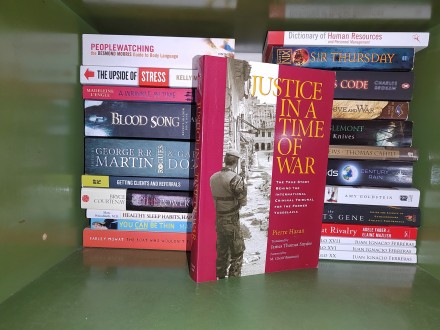Justice in a Time of War, True Story Behind...
| Cena: |
| Želi ovaj predmet: | 2 |
| Stanje: | Polovan bez oštećenja |
| Garancija: | Ne |
| Isporuka: | Pošta CC paket (Pošta) Post Express Lično preuzimanje |
| Plaćanje: | Tekući račun (pre slanja) PostNet (pre slanja) Pouzećem Lično |
| Grad: |
Smederevska Palanka, Smederevska Palanka |
ISBN: Ostalo
Godina izdanja: 2004
Jezik: Engleski
Autor: Strani
Haški tribunal
Justice in a Time of War
The True Story Behind the International Criminal Tribunal for the Former Yugoslavia By Pierre Hazan
Foreword by M. Cherif Bassiouni
Can we achieve justice during war? Should law substitute for realpolitik? Can an international court act against the global community that created it?
Justice in a Time of War is a translation from the French of the first complete, behind-the-scenes story of the International Criminal Tribunal for the Former Yugoslavia, from its proposal by Balkan journalist Mirko Klarin through recent developments in the first trial of its ultimate quarry, Slobodan Miloševi_. It is also a meditation on the conflicting intersection of law and politics in achieving justice and peace.
Le Monde’s review (November 3, 2000) of the original edition recommended Hazan’s book as a nuanced account of the Tribunal that should be a must-read for the new president of Yugoslavia. “The story Pierre Hazan tells is that of an institution which, over the course of the years, has managed to escape in large measure from the initial hidden motives and manipulations of those who created it (not only the Americans).”
With insider interviews filling out every scene, author Pierre Hazan tells a chaotic story of war while the Western powers cobbled together a tribunal in order to avoid actual intervention, hoping to threaten international criminals with indictment and thereby to force an untenable peace. The international lawyers and judges for this rump world court started with nothing—no office space, no assistants, no computers, not even a budget—but they ultimately established the tribunal as an unavoidable actor in the Balkans. This development was also a reflection of the evolving political situation: the West had created the Tribunal in 1993 as an alibi in order to avoid military intervention, but in 1999, the Tribunal suddenly became useful to NATO countries as a means by which to criminalize Miloševic’s regime and to justify military intervention in Kosovo and in Serbia. Ultimately, this hastened the end of Miloševic’s rule and led the way to history’s first war crimes trial of a former president by an international tribunal.
Ironically, this triumph for international law was not really intended by the Western leaders who created the court. They sought to placate, not shape, public opinion. But the determination of a handful of people working at the Tribunal transformed it into an active agent for change, paving the road for the International Criminal Court and greatly advancing international criminal law. Yet the Tribunal’s existence poses as many questions as it answers. How independent can a U.N. Tribunal be from the political powers that created it and sustain it politically and financially ?
Hazan remains cautious though optimistic for the future of international justice. His history remains a cautionary tale to the reader: realizing ideals in a world enamored of realpolitik is a difficult and often haphazard activity.
Predmet: 70728053











